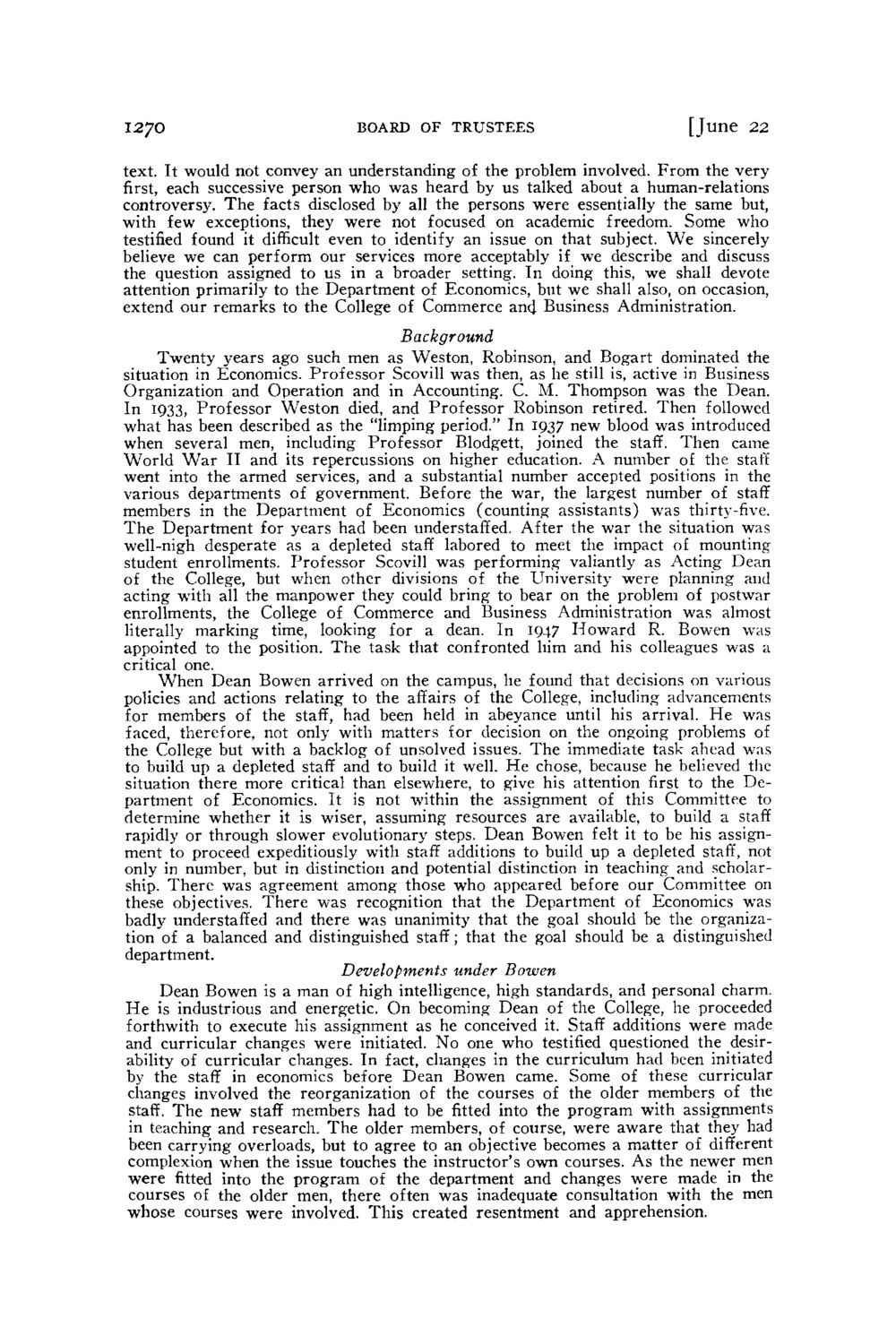| |
| |
Caption: Board of Trustees Minutes - 1950
This is a reduced-resolution page image for fast online browsing.

EXTRACTED TEXT FROM PAGE:
1270 BOARD OF TRUSTEES [June 22 text. It would not convey an understanding of the problem involved. From the very first, each successive person who was heard by us talked about a human-relations controversy. The facts disclosed by all the persons were essentially the same but, with few exceptions, they were not focused on academic freedom. Some who testified found it difficult even to identify an issue on that subject. W e sincerely believe we can perform our services more acceptably if we describe and discuss the question assigned to us in a broader setting. In doing this, we shall devote attention primarily to the Department of Economics, but we shall also, on occasion, extend our remarks to the College of Commerce and Business Administration. Background Twenty years ago such men as Weston, Robinson, and Bogart dominated the situation in Economics. Professor Scovill was then, as he still is, active in Business Organization and Operation and in Accounting. C. M. Thompson was the Dean. In 1933, Professor Weston died, and Professor Robinson retired. Then followed what has been described as the "limping period." In 1937 new blood was introduced when several men, including Professor Blodgett, joined the staff. Then came World W a r II and its repercussions on higher education. A number of the staff went into the armed services, and a substantial number accepted positions in the various departments of government. Before the war, the largest number of staff members in the Department of Economics (counting assistants) was thirty-five. T h e Department for years had been understaffed. After the war the situation was well-nigh desperate as a depleted staff labored to meet the impact of mounting student enrollments. Professor Scovill was performing valiantly as Acting Dean of the College, but when other divisions of the University were planning and acting with all the manpower they could bring to bear on the problem of postwar enrollments, the College of Commerce and Business Administration was almost literally marking time, looking for a dean. In 1947 Howard R. Bowen was appointed to the position. The task that confronted him and his colleagues was a critical one. When Dean Bowen arrived on the campus, he found that decisions on various policies and actions relating to the affairs of the College, including advancements for members of the staff, had been held in abeyance until his arrival. H e was faced, therefore, not only with matters for decision on the ongoing problems of the College but with a backlog of unsolved issues. The immediate task ahead was to build up a depleted staff and to build it well. He chose, because he believed the situation there more critical than elsewhere, to give his attention first to the Department of Economics. It is not within the assignment of this Committee to determine whether it is wiser, assuming resources are available, to build a staff rapidly or through slower evolutionary steps. Dean Bowen felt it to be his assignment to proceed expeditiously with staff additions to build up a depleted staff, not only in number, but in distinction and potential distinction in teaching and scholarship. There was agreement among those who appeared before our Committee on these objectives. There was recognition that the Department of Economics was badly understaffed and there was unanimity that the goal should be the organization of a balanced and distinguished staff; that the goal should be a distinguished department. Developments under Bowen Dean Bowen is a man of high intelligence, high standards, and personal charm. H e is industrious and energetic. On becoming Dean of the College, he proceeded forthwith to execute his assignment as he conceived it. Staff additions were made and curricular changes were initiated. No one who testified questioned the desirability of curricular changes. In fact, changes in the curriculum had been initiated by the staff in economics before Dean Bowen came. Some of these curricular changes involved the reorganization of the courses of the older members of the staff. The new staff members had to be fitted into the program with assignments in teaching and research. The older members, of course, were aware that they had been carrying overloads, but to agree to an objective becomes a matter of different complexion when the issue touches the instructor's own courses. As the newer men were fitted into the program of the department and changes were made in the courses of the older men, there often was inadequate consultation with the men whose courses were involved. This created resentment and apprehension.
| |